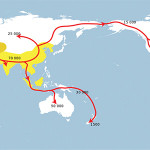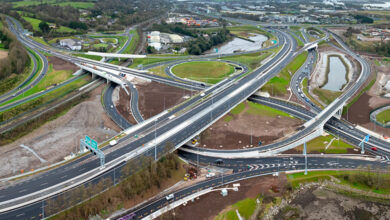Why we travel
 The Independent Transport Commission’s General Secretary, Matthew Niblett, explains how research is seeking to better understand the rationale for human movement.
The Independent Transport Commission’s General Secretary, Matthew Niblett, explains how research is seeking to better understand the rationale for human movement.
At a time of economic austerity, many European governments have stressed the importance of investing in transport infrastructure as a way to boost the economy. Part of the justification is that these projects will help to serve our anticipated movement needs over the coming decades.
Understanding what those needs are, however, is arguably an issue that requires much greater investigation, particularly since official forecasts have been poor at anticipating recent travel trends in many developed countries. In the UK, for example, government models consistently failed to predict the stagnation in car travel and rapid rise in rail travel since the mid-1990s.
What actually determines our travel choices and preferences, and can the answers be found in the intrinsic drivers of human behaviour?

The Independent Transport Commission, a leading research charity based in London, has been attempting to unpick these questions by exploring a wide range of research from the sciences and humanities that is causing us to rethink human movement.
Much of this research, undertaken by experts in fields from evolutionary biology to psychology and sociology, is largely unknown in the transport world. Yet it is becoming clear that travel might not merely be a demand derived from other activities (as is commonly assumed in transport modelling) but also an inherent need that is central to our physical and psychological well-being.
One of the most striking areas of recent research has looked at the effects of bipedalism, or the ability to walk upright, on the development of human behaviour. Evolutionary biologists have discovered that this change was linked to massive tectonic and climatic changes in East Africa about 3 million years ago that created a grass-dominated habitat with an increased variability of terrain.
As a result, our bodies became adapted to a process of travelling and searching over long distances, while our sweat glands allowed us to do this without overheating.
Over a long enough distance, some scientists have even suggested that man is capable of outrunning almost every other animal on earth. Meanwhile, the evolution of our arms and precision grip have enabled more than adequate proficiency at climbing, swimming and using tools to negotiate difficult terrain. All of these features served pre-modern humans well as they reached every corner of the globe except Antarctica.
The health benefits of physical movement and travel are well-known but research has also shown that human movement brings neural and psychological advantages.
Leading zoologists have shown that the evolution of our ability to travel long distances over grasslands was coupled with a massive growth in our neurological capacity to process a vast quantity of information about our environment.
An innate curiosity about that environment seems to have become hard-wired into the human brain. Neuroscientists Irving Biederman and Edward Vessell, for example, have described humans as ‘infovores’ and revealed that the neural pathways through which we learn about the world, including through travel and searching, tap into the same pleasure networks in the brain that are activated by opiates.
The release of opioids in the brain when exercising – often called the ‘runners’ high’ – is well-known but research is also revealing that travel may improve our creativity and problem-solving abilities, caused by a sense of ‘psychological distance’ in which the self is separated from an event or problem by spatial or temporal distance.
Our propensity to travel is also supported by anthropologists, who have discovered that the average time we humans spend travelling each day (about an hour) has remained remarkably consistent across societies and civilisations.
What might this research mean for the way that we make travel policy today?
The implications of there being underlying physical and psychological motivations behind our desire to move around, or to achieve variety in our surroundings, point to a rethink in the way we plan transport.
Firstly, it indicates that travel has an intrinsic utility beyond merely being a derived demand, and that much greater weight should be placed on how we experience travel.
Secondly, it suggests that the opportunity to travel should be considered an important aspect of social equity and well-being. The way we design our travel schemes and cities should therefore reflect the importance of promoting mobility (particularly of the human-powered kind) across the settlements where we reside.
And thirdly, it can help us achieve a much improved understanding of travel demand, as well as enhanced appraisal methods which allow for the positive benefits derived from movement.
In so doing, we might come to appreciate why the journey is as important as the destination, and deliver investment that truly serves our needs.
More information on the project is available at www.whytravel.org





